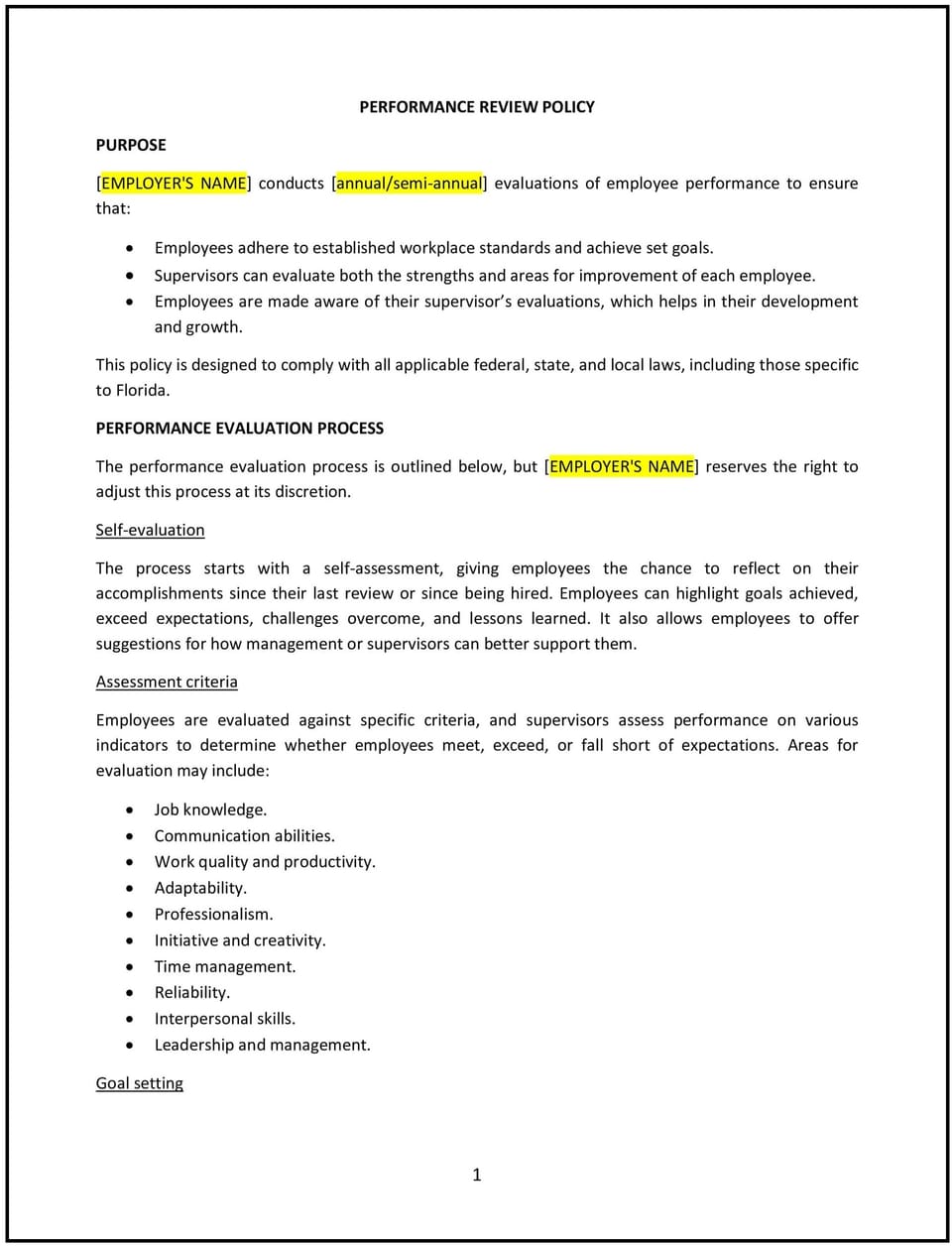Performance review policy (Florida)

Performance review policy (Florida)
A performance review policy helps Florida businesses establish a structured approach for evaluating employee performance, providing feedback, and fostering professional development. This policy outlines procedures for conducting reviews, setting goals, and addressing performance issues while promoting fairness, transparency, and continuous improvement. It is designed to promote accountability, enhance employee engagement, and provide clear guidelines for managing performance evaluations.
By implementing this policy, businesses in Florida can demonstrate their commitment to ethical practices, enhance operational efficiency, and align with the state’s focus on fostering a supportive and responsible workplace.
How to use this performance review policy (Florida)
- Define review criteria: Clearly specify the criteria used to evaluate employee performance, such as job responsibilities, productivity, teamwork, and professional development.
- Establish review intervals: Outline how often performance reviews will be conducted, such as annually, semi-annually, or quarterly.
- Address goal-setting procedures: Explain how employees and managers should collaboratively set goals, including SMART (Specific, Measurable, Achievable, Relevant, Time-bound) objectives.
- Provide feedback mechanisms: Specify how feedback will be provided, including written evaluations, verbal discussions, and self-assessments.
- Address performance improvement: Outline steps for addressing underperformance, including performance improvement plans (PIPs) and support resources.
- Communicate the policy: Share the policy with employees during onboarding and through regular communications to ensure awareness and understanding.
- Monitor adherence: Regularly review how the policy is applied and address any concerns or discrepancies promptly.
- Update the policy: Periodically assess the policy to reflect changes in workplace dynamics, legal standards, or business needs.
Benefits of using this performance review policy (Florida)
This policy offers several advantages for Florida businesses:
- Promotes accountability: Clear guidelines help ensure that performance evaluations are conducted consistently and without bias.
- Enhances engagement: Defined procedures minimize misunderstandings and ensure that employees are aware of their performance expectations.
- Builds trust: Demonstrates the business’s commitment to fairness and employee development.
- Aligns with community values: Reflects Florida’s emphasis on fairness, transparency, and mutual respect in the workplace.
- Enhances reputation: A robust policy showcases the business’s dedication to ethical practices and operational integrity.
- Improves decision-making: Helps businesses anticipate potential issues and incorporate safeguards into performance evaluations.
- Supports growth: A strong framework for performance reviews fosters a culture of continuous improvement and adaptability.
Tips for using this performance review policy (Florida)
- Communicate clearly: Ensure employees understand the policy by providing written materials and discussing it during meetings or training sessions.
- Train managers: Educate supervisors on how to conduct fair and constructive performance reviews and provide meaningful feedback.
- Be consistent: Apply the policy consistently across all employees to ensure fairness and transparency.
- Stay informed: Keep up with changes in performance management trends, best practices, or legal considerations that may affect performance reviews.
- Encourage feedback: Solicit input from employees to identify areas for improvement and ensure the policy meets their needs.
- Review periodically: Assess the policy’s effectiveness and make updates as needed to reflect changes in workplace dynamics or business goals.
Q: Why should Florida businesses adopt a performance review policy?
A: Businesses should adopt this policy to promote accountability, enhance engagement, and demonstrate their commitment to ethical practices regarding performance evaluations.
Q: What types of criteria should businesses consider for performance reviews?
A: Businesses should consider criteria such as job responsibilities, productivity, teamwork, professional development, and adherence to company values.
Q: How should businesses handle goal-setting during performance reviews?
A: Businesses should involve employees in setting goals collaboratively, ensuring they are SMART (Specific, Measurable, Achievable, Relevant, Time-bound) and aligned with business objectives.
Q: Should businesses provide written evaluations for performance reviews?
A: Businesses should provide written evaluations to document performance discussions, goals, and areas for improvement, ensuring clarity and transparency.
Q: What should businesses do if an employee disagrees with a performance review?
A: Businesses should address disagreements promptly by discussing the employee’s concerns, providing additional context, and making adjustments as necessary.
Q: How can businesses ensure fairness in performance reviews?
A: Businesses should apply the policy consistently across all employees, ensuring that decisions are based on objective criteria and documented evidence.
Q: How often should businesses review the policy?
A: Businesses should review the policy annually or whenever there are significant changes in workplace dynamics, legal standards, or business operations.
This article contains general legal information and does not contain legal advice. Cobrief is not a law firm or a substitute for an attorney or law firm. The law is complex and changes often. For legal advice, please ask a lawyer.


